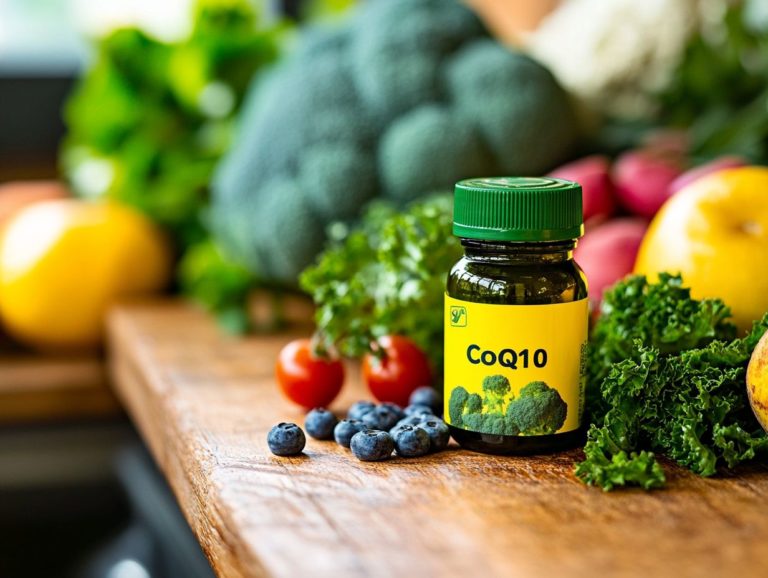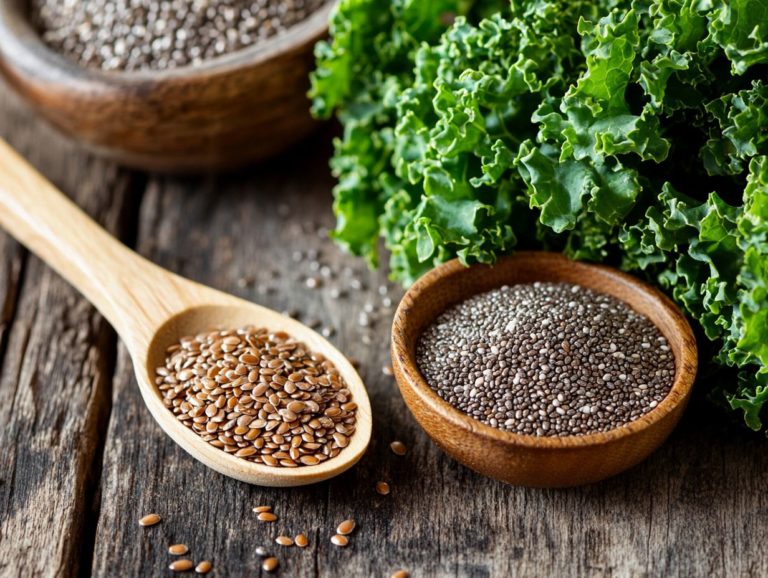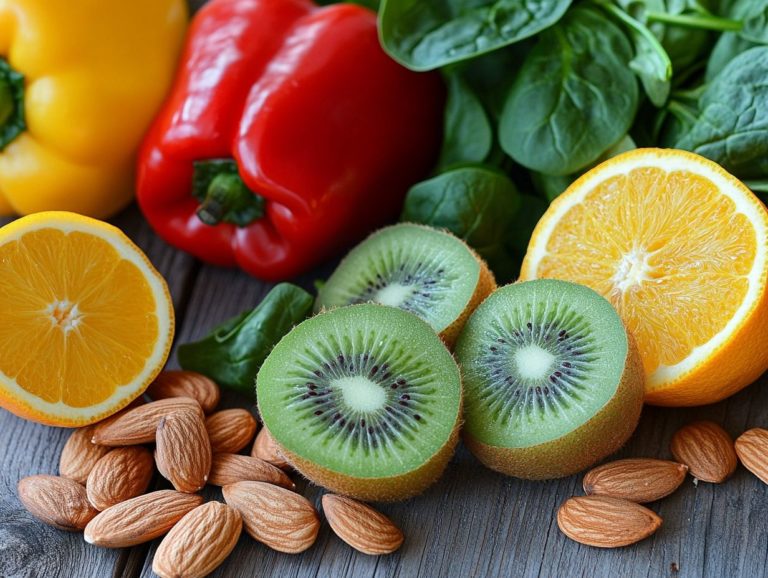10 Benefits of Spirulina You Should Know
Spirulina, a striking blue-green algae, has emerged as a sought-after superfood brimming with a multitude of health benefits.
This article presents ten compelling reasons for you to consider incorporating spirulina into your diet. From its impressive nutrient profile and potential detoxification properties to its positive impacts on blood sugar and cholesterol levels, the advantages are noteworthy.
Whether your aim is to boost energy levels, enhance mental well-being, or support weight loss, spirulina could very well be the powerhouse your wellness routine may be missing.
We will also explore effective ways to integrate it into your meals and clear up some common misconceptions surrounding this superfood. Discover the amazing benefits of spirulina now! Let s delve into it!
Contents
- Key Takeaways:
- 1. Rich in Nutrients and Antioxidants
- 2. Can Help with Detoxification
- 3. May Help Improve Blood Sugar Levels
- 4. Can Aid in Weight Loss
- 5. May Have Anti-Cancer Properties
- 6. Can Help Lower Cholesterol
- Breathe Easier: Spirulina for Allergies!
- 8. Can Boost Energy Levels
- 9. May Improve Muscle Strength and Endurance
- 10. Can Help with Mental Health
- What Is Spirulina and How Is It Cultivated?
- Frequently Asked Questions
Key Takeaways:
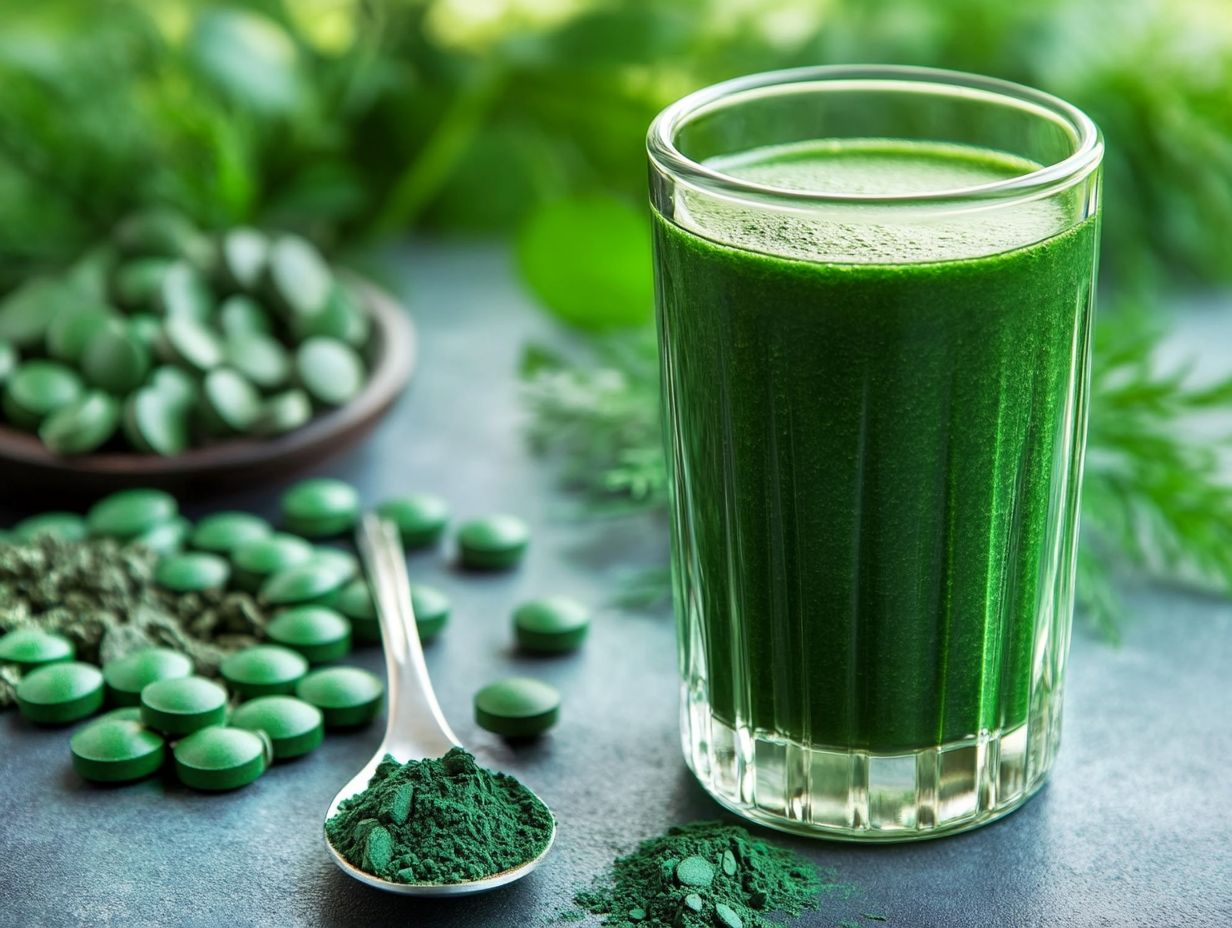
Spirulina is a nutrient-dense superfood, rich in antioxidants that can help improve overall health and prevent chronic diseases.
Incorporating spirulina into your diet can aid in detoxification and improve blood sugar levels, making it beneficial for those with diabetes. It may have anti-cancer properties and can help lower cholesterol, improve allergies, boost energy, and promote mental health.
1. Rich in Nutrients and Antioxidants
Spirulina, that blue-green algae cherished since the Aztec era, is a treasure trove of essential nutrients and antioxidants. It is a remarkable superfood that elevates your overall wellness and nutrition.
Brimming with vitamins B1, B2, and B3, this nutrient-dense algae is particularly advantageous for boosting your energy production and metabolism. Its rich antioxidant profile includes phycocyanin, a blue-green pigment known for its health benefits, which gives Spirulina its striking hue.
Studies have shown that phycocyanin can significantly combat harmful damage to your cells by neutralizing free radicals.
For instance, a 2016 study found that Spirulina supplementation could reduce oxidative damage in cells by as much as 36%. With a protein content of around 60-70% by weight, Spirulina stands out as an excellent plant-based protein alternative for anyone looking to enhance their protein sources.
Ultimately, incorporating Spirulina into your diet can significantly elevate your nutritional intake while promoting your overall health.
2. Can Help with Detoxification
Spirulina has earned its reputation for being a remarkable ally in your body s detoxification journey, fostering a healthier immune system and enhancing your overall well-being.
This striking blue-green algae is packed with nutrients that assist in eliminating toxins and heavy metals like lead and mercury, which can build up over time and jeopardize your health.
Research reveals that its abundant antioxidants, especially phycocyanin, not only neutralize free radicals but also optimize your body s natural detoxification pathways.
Regularly incorporating Spirulina into your diet can strengthen your immune responses, equipping your body to better combat illnesses. By adding this superfood to your routine, you can experience greater vitality and feel lighter!
3. May Help Improve Blood Sugar Levels
Emerging research suggests that Spirulina could be a valuable ally in your journey to improve blood sugar levels, making it an excellent supplement for anyone managing diabetes.
Several studies indicate that Spirulina can enhance insulin sensitivity, a crucial component of effective blood sugar management.
This blue-green algae helps improve glucose metabolism, potentially leading to lower fasting blood sugar levels.
For instance, in a clinical trial involving diabetic participants, those who incorporated regular Spirulina supplementation experienced significant reductions in their blood sugar levels.
This algae boasts phycocyanin, a pigment with antioxidant properties that might help shield you from harmful damage to your cells, thereby promoting optimal metabolic health.
If you re at risk, particularly if you re pre-diabetic, adding Spirulina to your dietary regimen could be a smart move, especially as research continues to delve into its effects on overall glucose homeostasis.
4. Can Aid in Weight Loss
Incorporating Spirulina into your balanced diet can be a strategic move in your weight loss journey, thanks to its nutrient-rich content that may help combat chronic conditions associated with obesity.
This remarkable blue-green algae is also a protein powerhouse! It offers a wealth of vitamins, minerals, and antioxidants that can enhance your overall health. Its impressive protein content promotes feelings of fullness, making it easier to resist unhealthy snacks.
To seamlessly integrate Spirulina into your weight loss regimen, consider adding it to:
- smoothies
- salads
- yogurt
These additions can provide a nutritious lift! It can also be a fantastic addition to soups, enhancing satiety while keeping your calorie counts in check. Plus, with its ability to stabilize blood sugar levels, Spirulina can support sustained energy throughout your day.
5. May Have Anti-Cancer Properties
Preliminary studies suggest that Spirulina may have anti-cancer properties, largely due to its impressive antioxidant content that helps combat oxidative stress.
This remarkable microalga is packed with compounds like phycocyanin and beta-carotene, known for their ability to neutralize free radicals in the body. Free radicals are unstable molecules that can harm your cells and potentially lead to cancer.
A study published in the journal Cancer Letters highlighted that phycocyanin not only displayed anti-inflammatory effects but also inhibited cancer cell growth in laboratory settings. Consider incorporating Spirulina into your diet to bolster your body’s defenses against cancer!
While further research is needed, these findings offer promising insights into how certain antioxidants found in Spirulina could play a significant role in cancer prevention.
6. Can Help Lower Cholesterol
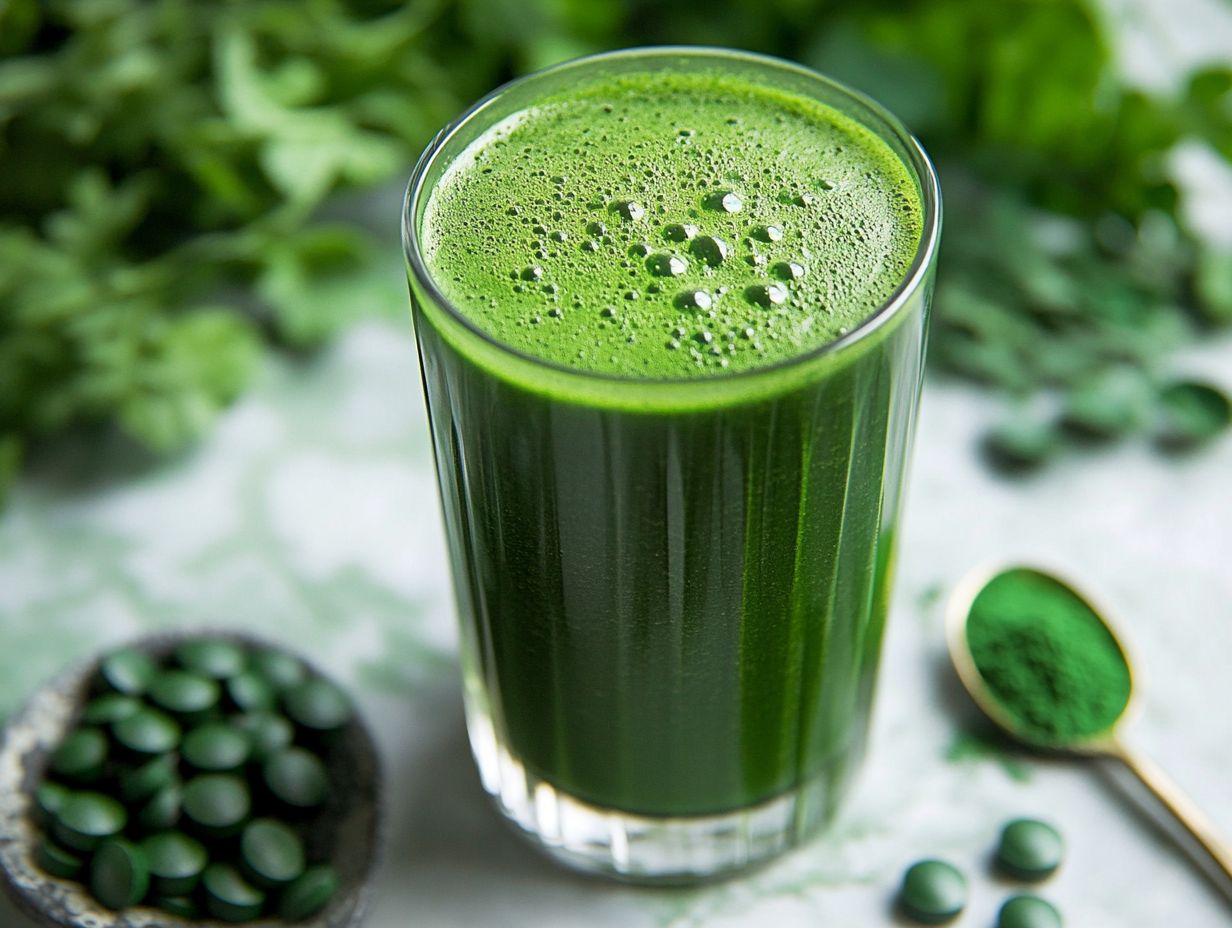
Research indicates that adding Spirulina to your routine can be a game-changer for lowering cholesterol levels, a key factor in managing hypertension and enhancing cardiovascular health.
This remarkable blue-green algae has attracted attention from clinical studies for its ability to positively affect lipid profiles. Specifically, it reduces low-density lipoprotein (LDL), known as “bad cholesterol,” while boosting high-density lipoprotein (HDL), known as “good cholesterol.”
In one randomized controlled trial, participants who added Spirulina to their diets saw a significant drop in total cholesterol levels, along with a remarkable improvement in their HDL/LDL ratio. Another study showed that regular consumption of Spirulina led to notable reductions in triglycerides, highlighting its potential as a natural supplement for anyone looking to manage cholesterol effectively.
These findings underscore how adding Spirulina to a balanced diet can support healthy cholesterol levels and contribute to overall heart health. Try incorporating Spirulina into your meals today for a healthier tomorrow!
Breathe Easier: Spirulina for Allergies!
Some studies suggest that Spirulina may help ease allergy symptoms, potentially enhancing your immune response to environmental allergens. If you’re dealing with allergies, you know how symptoms like nasal congestion, itchy eyes, and inflammation can disrupt your quality of life.
Research indicates that Spirulina might be instrumental in modulating your immune system by lowering histamine levels in the body, which is a primary culprit behind allergic reactions. In a study published in the Journal of Medicinal Food, participants who included Spirulina in their diet reported a marked reduction in nasal congestion and sneezing.
Experts also point out that its antioxidant properties bolster overall immune support, potentially lessening both the severity and frequency of allergic episodes. Consider trying Spirulina to breathe easier this allergy season!
8. Can Boost Energy Levels
Spirulina is often celebrated for its remarkable ability to elevate energy levels, making it a favored choice for those struggling with fatigue or chronic conditions.
Loaded with essential nutrients like B vitamins, iron, and easily digestible protein, this incredible algae is packed with nutrients that can supercharge your workouts! It plays a pivotal role in enhancing physical performance and speeding up recovery.
Research indicates that regularly incorporating spirulina into your diet can lead to improved endurance during workouts and a quicker return to form after intense activities.
Many users have reported significant boosts in their energy, enabling them to tackle daily exercise routines without succumbing to the usual fatigue.
In fact, one study even showcased that athletes consuming spirulina experienced a notable increase in aerobic endurance, solidifying its status as a valuable addition to any fitness regimen.
9. May Improve Muscle Strength and Endurance
Evidence suggests that Spirulina could be the secret weapon to enhance your muscle strength and endurance. This makes it an intriguing supplement for athletes and fitness enthusiasts like you.
Recent studies have shed light on Spirulina’s impressive benefits for those immersed in intense physical activities. For example, research published in the Journal of Medicinal Food revealed that athletes who added Spirulina to their diet experienced quicker muscle recovery times and a reduction in exercise-induced oxidative stress, which refers to harmful effects caused by unstable molecules in the body.
This remarkable algae boasts a rich nutrient profile, packed with high-quality protein and essential amino acids that can elevate your workout results.
To truly harness these benefits, consider incorporating Spirulina as part of a well-balanced diet. This approach will help ensure your nutrition is on point, ultimately promoting peak performance during and after your most challenging workouts.
10. Can Help with Mental Health
Research is beginning to uncover the potential role of Spirulina in enhancing mental health, suggesting that its nutrient profile may have a favorable impact on your mood and cognitive function.
With a powerful combination of antioxidants, including phycocyanin and beta-carotene, Spirulina combats oxidative stress, a contributor to anxiety and depression.
You ll find the presence of omega-3 fatty acids particularly noteworthy. These essential fats are well-established champions of brain health and crucial for your emotional well-being.
Studies have shown that individuals who consume omega-3-rich foods often report better mood stability. Imagine boosting your mood and sharpening your mind with just a daily dose of Spirulina!
Experts emphasize that incorporating Spirulina into your balanced diet could significantly enhance mental clarity and emotional resilience. This makes Spirulina an important addition for anyone looking for natural strategies to elevate their mental wellness.
What Is Spirulina and How Is It Cultivated?
Spirulina, an amazing blue-green algae rich in nutrients, is harvested for centuries, especially in regions like Lake Chad. It has gained recognition from prestigious organizations like the United Nations, NASA, and the European Space Agency for its impressive health benefits and its potential to thrive in various cultivation environments.
With roots that date back to ancient civilizations, this superfood is now revered for its abundant protein, vitamins, and minerals. This makes it an attractive dietary supplement for a wide range of individuals.
Spirulina is cultivated through different methods, including open pond systems that harness sunlight and natural water sources, as well as closed photobioreactors that create controlled environments to optimize output. Each approach has its own set of advantages and disadvantages, particularly concerning water usage and land impact.
As awareness of Spirulina continues to grow, its importance in addressing global food security issues becomes increasingly clear, especially in developing regions where malnutrition remains a significant challenge.
What Are the Different Forms of Spirulina?
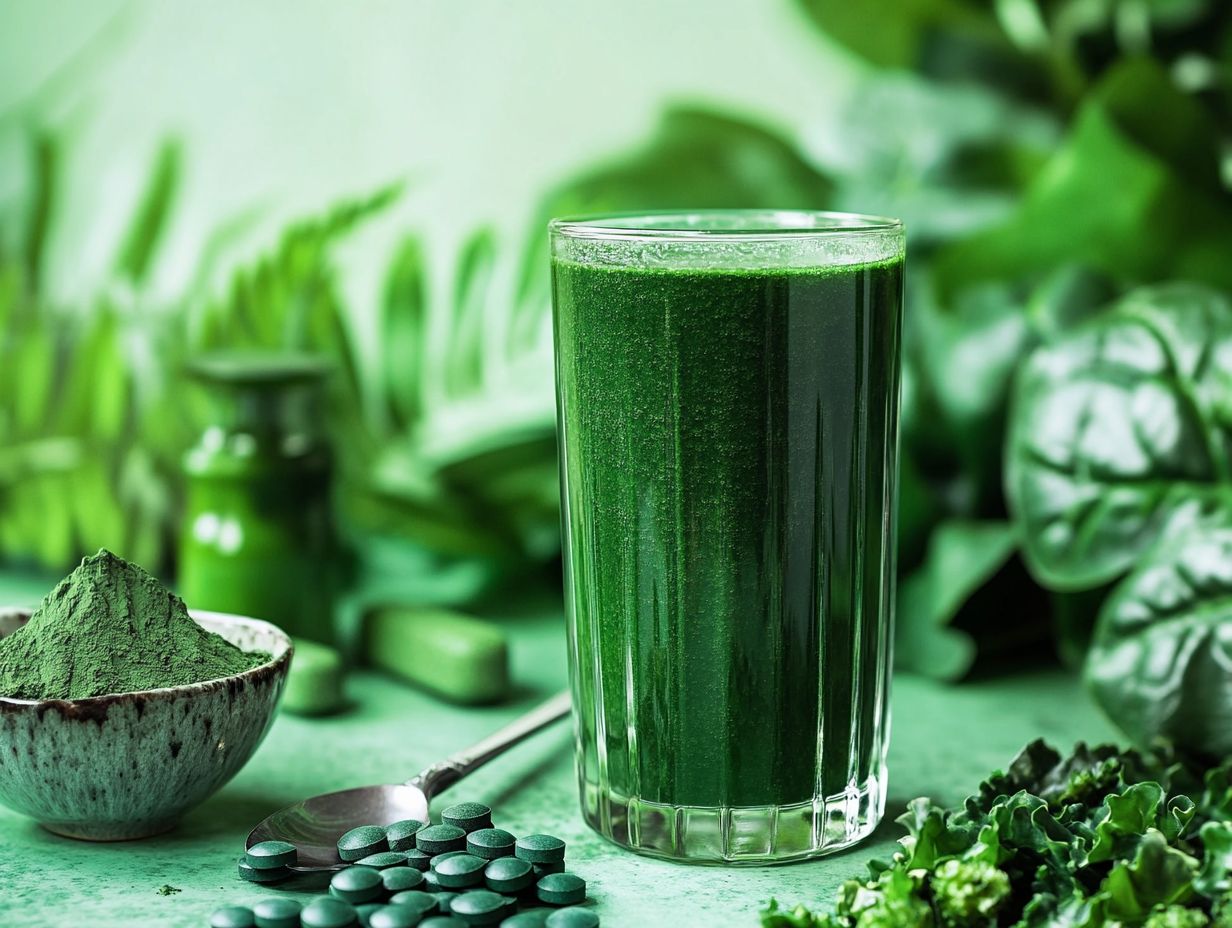
Spirulina comes in a variety of forms powders, tablets, and flakes each offering unique benefits and convenience tailored to your lifestyle. These diverse options allow you to seamlessly integrate this nutrient-rich superfood into your daily diet.
If you enjoy getting creative in the kitchen, powders can be effortlessly blended into smoothies or juices. This versatile option elevates your recipes with ease.
For those navigating a busy schedule, tablets provide the perfect on-the-go solution. They re easy to pop into your bag for a quick boost.
If you prefer a culinary approach, flakes can be sprinkled onto salads or stirred into soups, delivering a nutritious boost to your meals.
When choosing the most suitable form for yourself, consider factors such as ease of use, dietary preferences, and your personal health goals. This way, you can ensure that Spirulina effectively enhances your wellness journey.
How Much Spirulina Should One Consume?
Determining the ideal dosage of Spirulina varies based on individual health goals. A smart approach is to begin with a small amount and gradually increase it to gauge both safety and effectiveness.
For optimal wellness, start with 1 to 3 grams daily. If weight loss is your focus, a slightly higher intake of about 3 to 5 grams may suit your needs better.
Athletes often require more sometimes up to 10 grams daily, especially during periods of intense training.
Remember, factors such as age, overall health, and dietary preferences play a significant role in pinpointing the right dosage for you.
Younger individuals might metabolize nutrients differently than older adults. If you have specific health conditions, consulting a healthcare professional for personalized advice is always a wise choice.
What Are the Possible Side Effects of Spirulina?
While Spirulina is typically regarded as safe for most people, it’s essential to be aware of potential side effects and drug interactions. This is especially important if you have pre-existing health conditions like autoimmune disorders or phenylketonuria (PKU), a genetic disorder that affects how the body processes protein.
Individuals with such conditions may experience heightened reactions to Spirulina due to its stimulating effects on the immune system or its unique amino acid profile.
If you’re on anticoagulant medications, exercise caution; Spirulina might influence blood clotting and could lead to complications.
To mitigate any risks, consult a healthcare provider before incorporating Spirulina into your routine, particularly if you’re managing specific health concerns or taking multiple medications. Starting with a smaller dose and observing how your body reacts can help avoid any adverse effects.
How Can Spirulina Be Incorporated into One’s Diet?
Incorporating Spirulina into your diet can be effortless and delightful, thanks to a myriad of recipes and methods that elevate your meals and snacks.
Imagine the vibrant green of Spirulina transforming your favorite fruit smoothie! Not only does it enhance the nutritional profile, but it also makes your drink visually exciting.
Sprinkling Spirulina over a fresh salad introduces a unique earthy flavor while providing a rich source of protein and antioxidants.
The key is creativity; consider stirring it into homemade energy bars or mixing it into pancake batter for a nutritious breakfast twist.
By experimenting with various dishes, you can seamlessly incorporate this superfood into your daily routine while maintaining a balanced and healthful diet.
Why not try Spirulina in your next meal? Get creative and see how it can elevate your diet!
Ready to supercharge your meals? Explore different forms of Spirulina today!
What Are the Common Misconceptions About Spirulina?
Despite its soaring popularity, several misconceptions about Spirulina continue to circulate, often clouding your understanding of its health benefits and best usage.
Some people mistakenly believe Spirulina can replace a balanced diet entirely, but this is a misconception.
Spirulina is rich in nutrients and offers many health benefits. It should complement a varied diet, not replace whole foods.
Some people assume that Spirulina is right for everyone, but it’s crucial to be mindful of potential allergies or interactions with specific medications.
It’s also important to know the right dosage, as excessive intake can lead to unwanted side effects.
Clear up these misconceptions to unlock all the amazing benefits Spirulina can offer!
Frequently Asked Questions
What is spirulina?
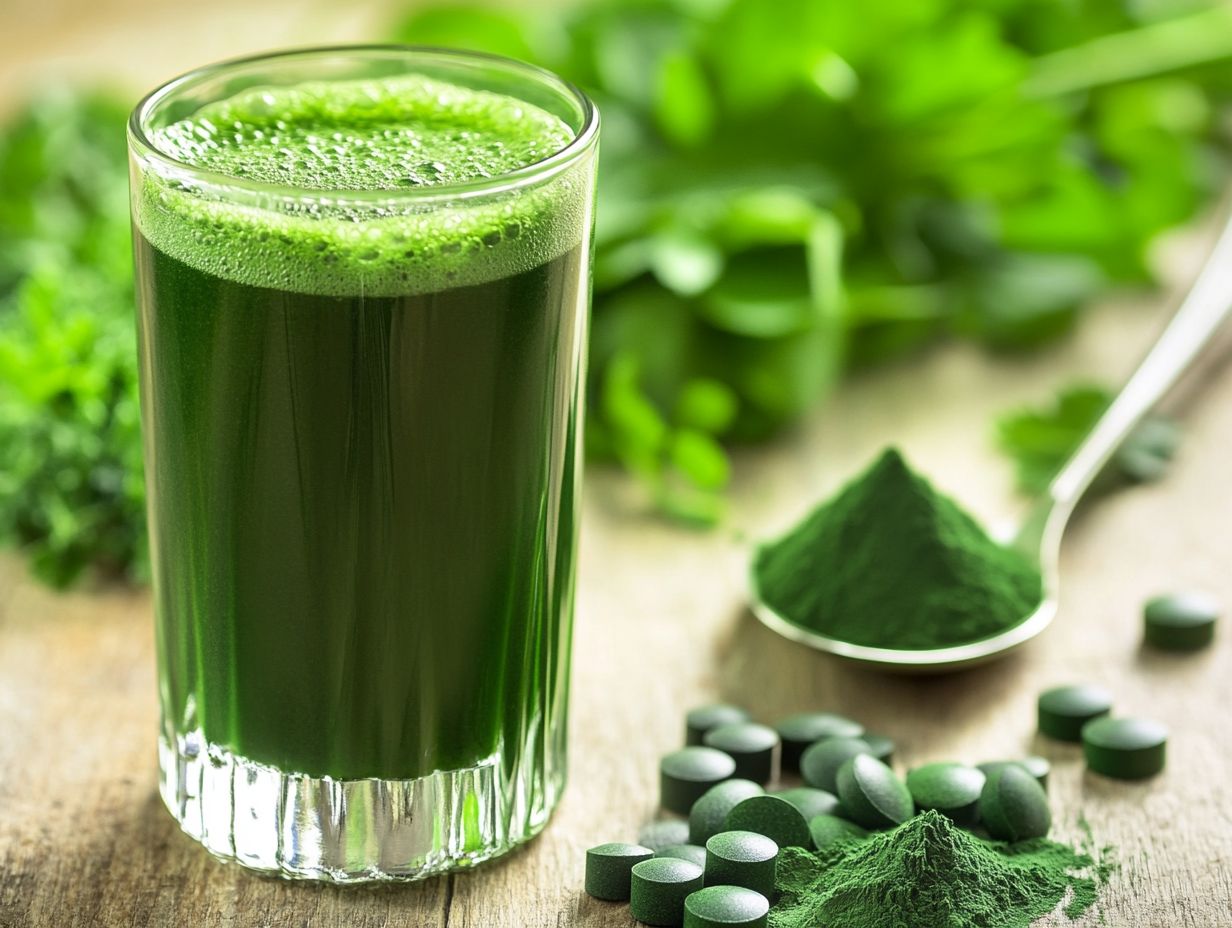
Spirulina is a type of blue-green algae that is packed with nutrients and considered a superfood. It is often consumed in supplement or powder form.
What are the 10 benefits of spirulina?
Spirulina improves immunity, boosts energy, aids digestion, lowers cholesterol, controls blood sugar, reduces inflammation, strengthens muscles, supports heart health, detoxifies, and may help reduce cancer risk.
How does spirulina improve the immune system?
Spirulina contains a high concentration of vitamins, minerals, and antioxidants that help boost the immune system and protect against infections and illnesses.
Is spirulina suitable for vegetarians and vegans?
Yes, spirulina is a suitable supplement for vegetarians and vegans as it is a plant-based source of protein, iron, and other essential nutrients.
What is the recommended daily dosage of spirulina?
The recommended daily dosage of spirulina varies depending on the individual’s health and age. However, the general recommended dosage is 1-3 grams per day.
Are there any side effects of consuming spirulina?
In most cases, spirulina is safe for consumption and does not cause any adverse effects. However, some people may experience mild side effects such as stomach upset, nausea, or allergic reactions. It is advised to consult with a healthcare professional before adding spirulina to your diet.
Whether you’re a newbie or a Spirulina pro, share your experiences with us below!



